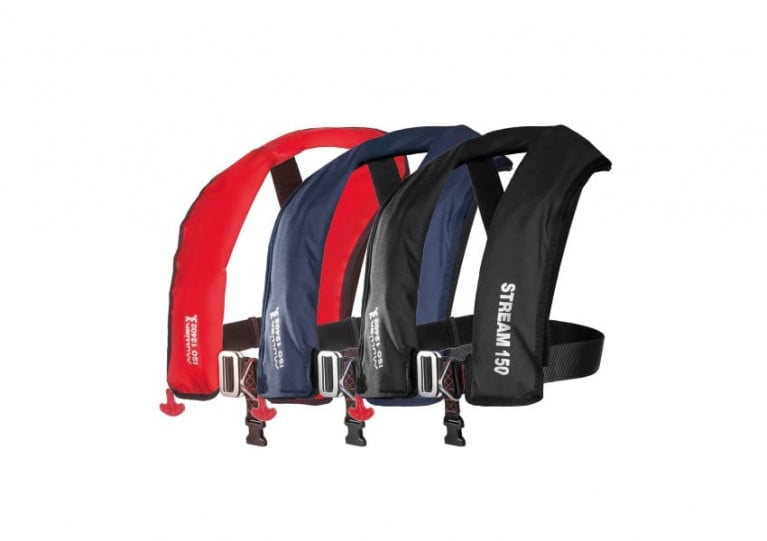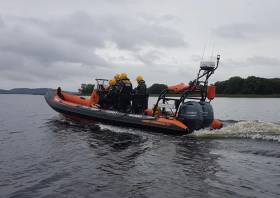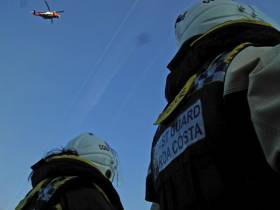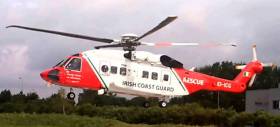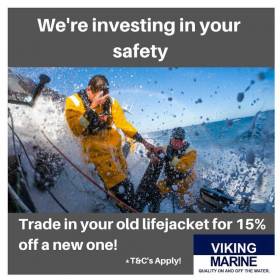Displaying items by tag: lifejackets
The UK’s Office for Product Safety and Standards have announced the recall of a life jacket following concerns over safety.
It says the Northern Diver 275N twin chamber life jacket (model numbers LS600, LS6100, LS6200) has been identified as presenting a high risk of drowning to the wearer.
The office adds that the adult-sized life jacket has not undergone conformity assessment as PPE, it is not CE- or UKCA-marked and there is no Declaration of Conformity as PPE.
Owners of the above product are advised to stop using the life jackets and contact the distributor they purchased it from or contact Northern Diver. You can also visit the Product Safety Alerts, Reports and Recalls page on the GOV.UK website for further information.
You can find guidance on fitting and maintaining your life jacket or buoyancy aid on the Safety pages of the RYA website.
UK Safety Office Issues Recall Notice for Popular Lifejacket
The UK’s Office for Product Safety & Standards have announced the recall of a popular lifejacket over safety concerns.
The product, which was sold via Amazon as Life Jacket 150N, has been identified as presenting a serious risk of drowning to the user if relied upon as protection in the water.
Amazon has since removed the product listing from its online marketplace and the OPSS is requiring the recall of the product from end users.
Owners of the above product are advised to visit the Product Safety Alerts, Reports and Recalls page on the GOV.UK website for further information and next steps.
The UK’s Office for Product Safety and Standards has announced a product recall for 11 models of lifejackets sold via online retailer Amazon over safety concerns.
Officials confirm that the affected products were not supplied with the required compliance documentation or markings to demonstrate that they have been adequately conformity assessed.
The models of lifejackets purchased by users via Amazon are those with the following brand names: NILIPEI, FLOATTOP, LIXONG, ROSOAMY, GRELANT, AJING, ZENING, STECTO, OMOUBOI, WELLPATH and Rrtizan.
The products do not meet the requirements of the PPE Regulation 2016/425 and as such, the Office for Product Safety and Standard recommend that owners stop using these products immediately. Owners are also recommended to contact the distributor to request redress.
For further information and product details, visit the GOV.UK website.
Water Safety Chief Suggests Mandatory Enforcement of Wearing Lifejackets
The Chief Executive of Water Safety Ireland has suggested that it may be time to introduce mandatory enforcement of wearing lifejackets.
"Perhaps it is time now to prioritise water safety in Ireland even more than ever and do as was done with road safety. In particular, the enforcement of wearing a lifejacket and making water safety and swimming skills a mandatory part of our Primary School curriculum and not discretionary as it is at present," says John Leech, CEO of, the statutory agency established to promote water safety in Ireland.
His comments follow analysis of drownings and emergency rescue incidents during the past Summer when there were more people holidaying at home due to pandemic restrictions. More calls for rescue were made on beach lifeguards, to the RNLI, the Coast Guard and Community Rescue Boats.
 National Lifeguard Training Centre in Tramore
National Lifeguard Training Centre in Tramore
"There have been 47 fatal drownings so far this year, that is 14 more than for the same time last year, which is concerning, and we fear that we could end up with more drownings than last year when we had the lowest number since 1936," he says.
John Leech, Podcast guest this week, has also warned about the dangers of entanglement in weeds while swimming in freshwater, a situation which he says, has deteriorated because of the advent of invasive weed species to Irish rivers and lakes.
PODCAST here
Irish people are more likely to take water safety seriously if it doesn’t involve obeying a law.
As The Sunday Independent reports, almost two decades after wearing a lifejacket first became compulsory in Ireland, legislation has proved so unenforceable that there have only been a handful of prosecutions.
However, Ireland is still at the top of the league table in lifejacket use, according to Water Safety Ireland (WSI) chief executive John Leech.
Educational campaigns, rather than legislation, may be the main reason for compliance at an average of over 80 per cent, Leech says.
Wearing lifejackets on the decks of fishing vessels became law in 2002 under a statutory instrument introduced by former Fianna Fáíl marine minister Frank Fahey.
Children up to the age of 16 years on mechanically-propelled pleasure craft, jetski operators and certain categories of commercial passenger boats were also covered by the initial legislation.
However, in 2003, then marine minister Dermot Ahern said that he would be extending mandatory wearing of lifejackets to everyone except surfers and oars people involved in competitive rowing.
The previous year, five people lost their lives in the Pisces angling boat accident off Fethard-on-Sea, Co Wexford. None of the victims had been wearing any sort of flotation device.
When the Pleasure Craft (Personnel Flotation Devices and Operation( Safety) Regulations came into effect in 2005, the Garda were automatically empowered to implement them, and other officers could be authorised by the relevant minister and other bodies including a harbour authority.
The 2005 regulations required that there must be suitable PFDs/lifejackets for everyone on board any pleasure craft of any length.
The regulations also required that PFDs must be worn by anyone on board an open craft or on the deck of a craft under seven metres (23 ft) in length and anyone under 16 years of age on any craft.
In addition, users of skis, donuts and jetskis were required to wear them.
The fine was fixed at 150 euro, and the only exceptions were made for divers, swimmers from a stationary vessel, or for those on board a vessel tied up alongside or made fast to an anchor, marina, pier or mooring.
However, legal experts warned that the regulations would be unenforceable without resources.
The Garda Press Office said that since 2006 there have been five incidents recorded under the Merchant Shipping Act relating to the “non-wearing of life vests”.
“Legislation is important, but education has proved to be more effective,” Leech said.
“This water safety awareness now starts in pre-schools, and is already well established in Irish primary schools,” he said.
Read The Sunday Independent here
The Mullion Stream 150N is the latest addition to the range of competitively priced, Irish-produced lifejackets at O’Sullivans Marine.
The Mullion Stream 150N automatic inflatable lifejacket is a constant-wear, all-weather lifejacket for general use with foul-weather clothing.
It comes in a standard horseshoe design with a touch and close fastening cover and a single back strap, harness and crutch strap, conforming to ISO standard 12402-3.
O’Sullivans Marine stocks a large selection of lifejackets and buoyancy aids for adults and children — and recently provided a guide for choosing the lifejacket that’s right for you.
The Tralee showroom is now back open for business alongside online orders at osmarine.ie, with free shipping on eligible orders over €60.
It’s hoped that five of the 23 Irish Coast Guard units whose boats were pulled from service over lifejacket safety issues could resume operations within days, as BreakingNews.ie reports.
Last month all coastguard rescue boat operations were suspended as the IRCG launched a probe into a malfunction of its standard issue lifejackets.
Community rescue boats, RNLI lifeboats and the Naval Service were called upon to provide cover for the 23 stations around Ireland that have been affected. The suspension does not apply to the IRCG’s shoreline and cliff rescue teams.
Management has now told volunteers that a new lifejacket, the Crewsaver 380N, is being introduced on a phased basis to replace the potentially affected Rescue 400.
Subject to testing and other operational requirements, this could see rescue boats back in service at the ‘priority’ stations of Mulroy and Greencastle (Co Donegal), Drogheda and Kilkee as soon as this Thursday 5 December. BreakingNews.ie has more on the story HERE.
Lifejacket Issues See Irish Coast Guard Boat Operations Suspended
All Irish Coast Guard rescue boat operations are suspended as of yesterday (Friday 15 November) as the organisation launches a probe into a malfunction in its standard issue lifejackets.
RTÉ News reports that the coastguard’s rescue boats in 23 stations around Ireland have been withdrawn from service amid concerns over the Rescue 400 lifejacket used by its personnel.
“Specifically, the 275N section of the lifejacket failed to fully function when activated,” said an email to IRCG officers in charge as seen by media yesterday.
The suspension does not affect the Irish Coast Guard’s shoreline and cliff rescue teams.
Community rescue boats, RNLI lifeboats and the Naval Service are reportedly providing on-the-water cover in affected areas.
Patrick McGurgan, a Northern Ireland coroner, has recently called for the introduction of a law to make the wearing of lifejackets compulsory in Northern Ireland, writes Betty Armstrong.
Mr McGurgan had heard two inquests following separate drowning deaths on inland waters which occurred in June and September of last year.
Kenny Andrews (31) of Bangor died in Lower Lough Erne at Muckross Bay, near Kesh, after falling from a jet ski which he and his friend Stephen Kennedy had taken out on the lough on Sunday 9 September 2018.
After turning the craft to return to shore, it capsized and both men were thrown into the water. Neither was wearing a wetsuit or lifejacket. Mr Kennedy survived, and the search continued for the second man.
A multi-agency response got underway involving the Community Rescue Service (CRS), PSNI, Northern Ireland Fire and Rescue Service, RNLI and Irish Coast Guard helicopter from Sligo.
Searching continued throughout the evening before being stood down for the night late on Sunday. It resumed the next day.
Volunteers from Strabane CRS assisted in the search for Mr Andrews. The CRS is a charitable organisation operated by volunteers from across the community in Northern Ireland.
They managed, with the use of a multi-beam side scan sonar device, to locate Mr Andrews’ body and, in a joint operation, it was recovered by the PSNI dive team.
Muckross is situated on the north shore of Lower Lough Erne less than a mile from Kesh. It has beaches, picnic areas, a public jetty and a small marina and is said to be very popular with jet skiers.
The other incident was at Portglenone Marina on the banks of the Lower River Bann, when Edelle McGlade from Portstewart fell overboard in the early hours of Thursday 26 June last year.
The marina was in darkness as the lights automatically switch off after 11.30pm and when Ms McGlade stepped off the boat onto the pontoon, she lost her balance, causing the boat to move slightly away, and she fell into the water.
Despite efforts to rescue her she died. The CRS located her body and brought her ashore.
Get 15% Off New Lifejacket With Your Old One At Viking Marine
As the weather gets colder, the winds get stronger and the waves get choppier, Viking Marine wants to make sure you have the best gear to keep you safe should you end up in the water.
The Dun Laoghaire chandlery is offering 15% off a new lifejacket in exchange for your old one.
The jacket must be an inflatable lifejacket and must have all its parts (gas canister, full or spent, with firing head and all straps).
Viking Marine’s team will be happy to show you your options and discuss the merits of different lifejacket types.
Be sure to drop in store at The Pavilion on Marine Road before Monday 11 November to avail of this special offer.



























